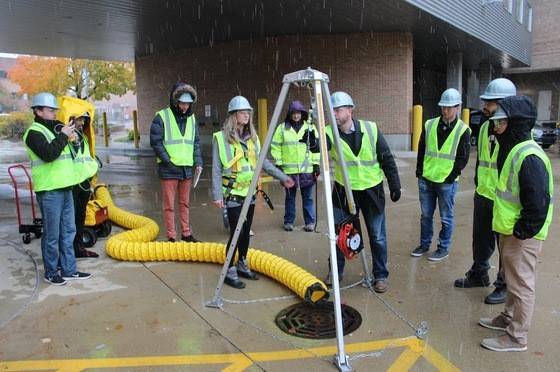Occupational Safety and Health Career Information
Common Job Titles
- Environmental Health and Safety Specialist
- Safety Engineer
- Safety Consultant
- Loss Control Consultant
- Safety Manager
- Risk Manager
- Risk Specialist
- Loss Control Manager
- Environmental Engineer
- Safety Director
- Vice President of Safety and Health
- Hazard Control Specialist
- Environmental Safety Engineer
- Regional EHS Manager
- Injury Prevention Specialist
- Corporate Safety Director
- Safety Compliance Officer
- Safety & Training Specialist
- Product Safety Engineer
- Risk Control Specialist
- Safety Coordinator

Typical Work Setting(s) Indoor/Outdoor
Industries where our graduates work include insurance, construction, food, furniture, government, aerospace, machinery and equipment, pharmaceuticals, entertainment, recycling, and breweries. Within these industries the typical work setting may be an office, a manufacturing facility, a laboratory, or outdoors.
Offices and health care facilities are usually clean and lit yet pose significant ergonomic and other risk factors. Industrial and manufacturing facilities pose similar problems as found in office and health care settings, but shift in the magnitude of problems based on job tasks and their risks. Working as a loss control consultant in the insurance industry would have you visiting all different types of industries on a daily basis, getting a good mix of it all.
Some facilities are well-planned, clean and present relatively low exposure to hazardous materials, chemicals, machines or other risks. Others have high noise levels, are difficult to keep clean, involve toxic chemicals or materials, and entail exposure to other significant risks. Travel may be extensive for those in government and insurance positions. International travel is not unusual for those employed by large corporations.
Leisure/Flexible Time: Average: 40-hour work week with occasional overtime. Generally "on call" 24 hours/day for emergency response, when working in facilities with two or more shifts. Working hours increase with level of responsibility. At upper management levels, the work week typically exceeds 40 hours.
Independence On-the-Job: Above average: Works independently to analyze and evaluate problems. Solutions must usually satisfy both labor and management and meet applicable governmental regulations.
Variety: A great amount: Uses variety of strategies and technologies to address safety and health issues in various work settings. Works with all levels of employees. Must be ready to respond to emergencies such as incident investigations.
Special Problems and Job Satisfaction
Occupational safety and health professionals may be exposed to hazardous materials, conditions, and machines as workers are. These exposures are usually short periods, and thus they are not dangerous. Often these individuals need to wear protective equipment for protection. Continuing education and seminar attendance should be expected, as it is important to keep up with changing government regulations and new technologies--robotics, exotic materials, etc.
Satisfactions: Active involvement in interpersonal contact with a wide range of people. Much of the work is self directed. Contribute to the organization's overall goals and objectives. Involved in guiding management and workforce in safety and health issues as well as environmental protection issues. The knowledge that one's efforts are protecting human life and resources provides a high degree of job satisfaction.
Contribution to Society: A great amount: Contributes significantly to the public good by protecting employee health and safety as well as environment, by limiting corporate goods and property loss, and by contributing to organizational goals and objectives.
Leadership: Above average and high visibility position: Advise all levels of management. Provides training for employees, coordinates all activities that have an impact on safety and health.
Prestige Level: Average/Above Average: The more hazardous the work environment, the higher the prestige level. The greater the facility commitment, the higher the prestige level.
Income Projections (Michigan)
Beginning Income: $55,000+ per year with a bachelor's degree in safety and less than 5 years' experience.
Median Income: $107,000 per year.
Top Earning Possibilities: $150,000+ per year.
Projections Based on the Board of Certified Safety Professionals 2023 Safety Health and Environmental Industry Safety Professional Salary Survey | BCSP for the State of Michigan.
National Employment Outlook
GOOD/VERY GOOD: The number of jobs is expected to continue to increase long-term in response to tougher state and federal regulations, increasing cost of workers' compensation and liability insurance, and reduced profit margins resulting from international competition. The best opportunities will probably occur in smaller, newer companies, the chemical/petroleum industries, and private consulting services. In environmental industries, there are good opportunities for those with knowledge and skills in handling hazardous materials, dealing with hazardous wastes and a variety of environmental safety and health problems, like environmental reporting. As more companies become self insured, greater emphasis is placed on safety and health issues and the need for educated safety professionals.
Where Employed - Across most businesses and industries. The largest employment groups include; insurance companies, health care facilities, service industries, construction, manufacturing, chemical/petroleum industries, municipalities, school systems, and transportation industries. Local, state, and federal agencies are hiring more safety professionals in anticipation of needing to comply with OSHA and EPA standards. A growing number of occupational safety specialists are employed by consulting firms or are self-employed.
Job Security - Excellent. As facilities become self-insured, safety becomes a higher facility commitment. Lateral and vertical advancement exists within most organizations and between organizations. Many safety professionals change companies within five years of employment with new positions representing more responsibility and at a larger salary.
Want more information?
Contact: Dr. David Huizen, Associate Professor and Unit Head
Phone: (616) 331-5596
Email: [email protected]
Office Address: Grand Valley State University, Eberhard Center 618f
301 Fulton St West
Grand Rapids, MI 49504

